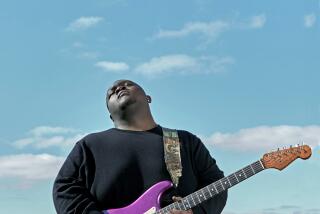This Kid’s ‘Gang’ Includes Folks Like Muddy Waters, B.B. King
- Share via
HELENA, Ark. — He ain’t got no bills, girlfriend or car--he is, after all, only 11 years old--but Marvin Sherrod’s got the blues.
While his classmates are throwing footballs or listening to rap, Marvin is on the road, pouring out Muddy Waters tunes like molasses on pancakes--like a down-and-out romantic shafted in love.
“I feel the blues,” says Marvin, keyboardist for J.B. and the Midnighters, out of Clarksdale, Miss. “Rap just talks about robbing and murdering. Blues makes you think about the future. It feels good.”
But the future of the blues depends on attracting kids like Marvin. So some schools--particularly in the Mississippi Delta--are offering “Kids and Blues” programs where youths learn about blues greats, write songs and perform at local venues. In cash-strapped schools, blues musicians are often brought in for single lectures rather than longer, pricier programs.
Then there’s Johnny Billington, a blues old-timer who has single-handedly taught 150 children--including Marvin and Howard Stovall, now executive director of the Blues Foundation in Memphis, Tenn.
“I knew that people were teaching the blues in the schools, but kids can get an education and not understand the art in the music,” says Billington, whose cataract-covered eyes speak to the soul.
“Rap is sending the wrong message,” he says. “These kids--and some of them are real good blues musicians--need to know that rather than snatching someone’s purse, they need to put things back in that purse. Blues tells the truth, whether that’s playing with your friends or losing a woman. It’s an ageless music that won’t send kids to the edge.”
Billington, 62, who’s played with Muddy Waters and Elmo James, has devoted the last 15 years of his life to taking wayward children under his wing and teaching them how to feel, and play, the blues. His most recent gig--and one of his biggest--was at this fall’s King Biscuit Blues Festival in Helena, a tiny town on the banks of the Mississippi.
Dependent on donations of instruments and cash, Billington teaches his pack how to bang out B.B. King--but also how to dress, read, talk, do homework and manage money earned from music gigs in the South. The band attends school four days a week and tours the other three.
And for Marvin, playing isn’t just a way to pass the time; it’s a way of connecting with his heritage.
“My mom used to listen to gospel and some blues,” he says. “This area is kind of known for it.”
Born in the 1920s in the Mississippi Delta, the blues grew as generations of blacks, and some whites, endured hardships ranging from abject poverty to racism to the deaths of loved ones. Memories lapsed after seven decades, and many kids today would rather forget the woeful past, Stovall says.
“A lot of kids think of blues as older music, so they’re more into listening to R&B; or rap,” he says. “Besides, when you turn on a radio, you usually don’t hear a lot of blues. You hear rap. It’s become the blues of the ‘90s.”
In Memphis, where grants have floated several “Blues and Kids” programs, children at six elementary schools and one high school are in a pilot project already being watched by record agents.
The program was started a year ago to tie the blues tradition to Memphis culture, explains Jim Holcomb, a performing arts specialist at Memphis city schools.
“We wanted to find some music to tie to social issues and to help kids understand where we’ve been and where we are now,” explains Stovall. “Each school was assigned a specific time period of the blues. About 700 kids have written lyrics, and a lot of them will be releasing a CD.”
But in schools where grants haven’t come so easily, music teachers rely on local blues greats like Billington for regular visits.
“It’s been something that we’ve been trying to work on,” says Tony Crockett, a music teacher at Marvell High School near Helena. “Sometimes the kids look bored when they learn about different blues guys, but sometimes you can really hear how they feel.”
Still, it’s a hard sell for kids bred on pop shows like “MTV Raps.”
“Yeah, blues can teach you about life, but rap, it’s like modern blues with a beat,” says Juniel Miller, a 15-year-old student of Crockett’s. “It talks about things that teenagers can relate to, like drugs and sex and stuff.”
Has Johnny Billington met his match or simply a new challenge?
“You know, in the ‘70’s I went up North, and when I came back to the South, I thought the blues had died,” Billington says. “But give these kids a chance, I mean listen to them play, and they’ll tell you their stories. They’ll show you that the blues isn’t dead, not even in kids.”
More to Read
The biggest entertainment stories
Get our big stories about Hollywood, film, television, music, arts, culture and more right in your inbox as soon as they publish.
You may occasionally receive promotional content from the Los Angeles Times.










